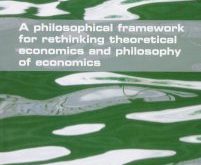My moral compass (personal) This is the advice I’ve always given my sons and daughters when they’ve come and asked for guidance when confronted with momentous moral issues in life: Ask yourself — Can I do this and still like what I see in the mirror tomorrow when I wake up? That moral compass has served me well for almost half a century now, and I’m sure it has also helped my youngsters to become the good and honest people they are.
Read More »More than economists
Veblen, Keynes, and Hirschman were more than economists because they practiced their economics from a standpoint outside the profession, using it to criticize not only the assumption of rational self-interest, but also the consequences of economists’ indifference to “preferences.” Veblen’s standpoint was explicitly religious; he was still of a believing generation. Keynes, too, was an ethicist. G.E. Moore’s Principia Ethica remained what he called his “religion under the...
Read More »The experimentalist ‘revolution’ in economics
The experimentalist ‘revolution’ in economics What has always bothered me about the “experimentalist” school is the false sense of certainty it conveys. The basic idea is that if we have a “really good instrument” we can come up with “convincing” estimates of “causal effects” that are not “too sensitive to assumptions.” Elsewhere I have written an extensive critique of this experimentalist perspective, arguing it presents a false panacea, andthat...
Read More »On wokeness and islamism
On wokeness and islamism .[embedded content]
Read More »A thousand kisses deep
A thousand kisses deep .[embedded content]
Read More »Et maintenant
.[embedded content]
Read More »Rethinking economics
The incorporation of new information makes sense only if the future is to be similar to the past. Any kind of empirical test, whatever form it adopts, will not make sense, however, if the world is uncertain because in such a world induction does not work. Past experience is not a useful guide to guess the future in these conditions (it only serves when the future, somehow, is already implicit in the present) … I believe the only way to use past experience is to assume that the...
Read More »Kathleen Stock — transgender and the limits of academic freedom
Kathleen Stock — transgender and the limits of academic freedom .[embedded content]
Read More »On tour
Guest appearance in Hamburg. Regular blogging to be resumed next week.
Read More »The presumed advantage of the experimentalist approach
The presumed advantage of the experimentalist approach Here, I want to challenge the popular view that “natural experiments” offer a simple, robust and relatively “assumption free” way to learn interesting things about economic relationships. Indeed, I will argue that it is not possible to learn anything of interest from data without theoretical assumptions, even when one has available an “ideal instrument”. Data cannot determine interesting economic...
Read More » Lars P. Syll
Lars P. Syll





